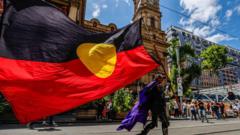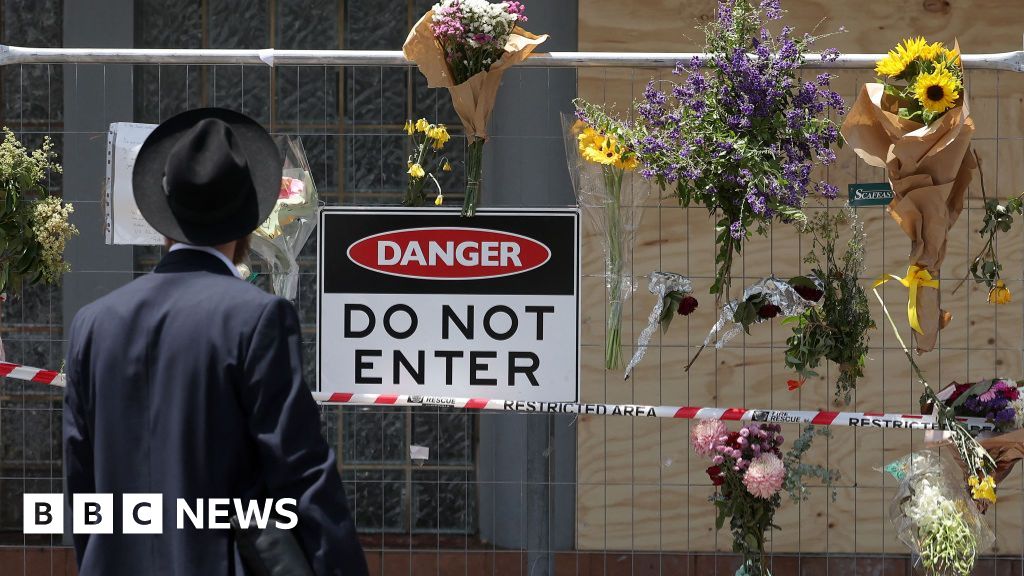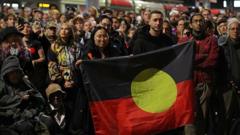In the lead-up to Australia's national election, the northern community of Yarrabah is witnessing a deafening silence regarding Indigenous issues. While the country gears up for the vote, the streets of Yarrabah are devoid of campaign posters and candidate visits. Suzanne Andrews, head of Gurriny Yealamucka Health Services, notes the absence of any political engagement on local concerns, particularly those affecting Aboriginal Australians.
Despite Indigenous people constituting approximately 3.8% of the Australian population and facing stark socio-economic disadvantages, the major political parties have largely steered clear of First Nations topics during this election season. The discomfort stems, in part, from the recent defeat of the Voice to Parliament referendum in 2023, which had aimed to give Aboriginal and Torres Strait Islander communities a greater say in government decisions.
The referendum's rejection, with 60% voting against it, has left many feeling a political void—as opinions have polarized and candidates perceive First Nations issues as electorally risky. Recent comments by Opposition leader Peter Dutton, who critiqued "welcome to country" ceremonies as excessive, highlight a troubling trend of marginalization.
Experts suggest the political atmosphere has reverted to a pre-referendum norm, where Indigenous policies are sidelined. Professor Rodney Smith points to the deep-rooted view among the electorate that First Nations issues are divisive, reflecting a broader disengagement from discussions relevant to Australia's Indigenous populations.
Prominent voices within the community, such as independent senator Lidia Thorpe and anti-Voice campaigner Warren Mundine, express concern that after the referendum, political discourse has ground to a halt. Thorpe emphasizes the missed opportunity for meaningful engagement during this election, while Mundine laments the lack of focus on necessary policy reforms for Indigenous Australians.
Despite ongoing challenges—including a national Closing the Gap strategy that is struggling to meet its own targets—politicians appear hesitant to address these pressing issues. Bob Katter openly acknowledges the political risk in broaching these topics, ultimately revealing the broader reluctance to tackle difficult conversations necessary for meaningful reform.
As Yarrabah's residents reflect on their situation—a community steeped in cultural significance yet facing significant disadvantages—the call for recognition and action grows. For many, the silence in the political arena underscores the urgency of returning Indigenous matters to the forefront, lest they remain invisible in the eyes of governance and the national conversation.
Despite Indigenous people constituting approximately 3.8% of the Australian population and facing stark socio-economic disadvantages, the major political parties have largely steered clear of First Nations topics during this election season. The discomfort stems, in part, from the recent defeat of the Voice to Parliament referendum in 2023, which had aimed to give Aboriginal and Torres Strait Islander communities a greater say in government decisions.
The referendum's rejection, with 60% voting against it, has left many feeling a political void—as opinions have polarized and candidates perceive First Nations issues as electorally risky. Recent comments by Opposition leader Peter Dutton, who critiqued "welcome to country" ceremonies as excessive, highlight a troubling trend of marginalization.
Experts suggest the political atmosphere has reverted to a pre-referendum norm, where Indigenous policies are sidelined. Professor Rodney Smith points to the deep-rooted view among the electorate that First Nations issues are divisive, reflecting a broader disengagement from discussions relevant to Australia's Indigenous populations.
Prominent voices within the community, such as independent senator Lidia Thorpe and anti-Voice campaigner Warren Mundine, express concern that after the referendum, political discourse has ground to a halt. Thorpe emphasizes the missed opportunity for meaningful engagement during this election, while Mundine laments the lack of focus on necessary policy reforms for Indigenous Australians.
Despite ongoing challenges—including a national Closing the Gap strategy that is struggling to meet its own targets—politicians appear hesitant to address these pressing issues. Bob Katter openly acknowledges the political risk in broaching these topics, ultimately revealing the broader reluctance to tackle difficult conversations necessary for meaningful reform.
As Yarrabah's residents reflect on their situation—a community steeped in cultural significance yet facing significant disadvantages—the call for recognition and action grows. For many, the silence in the political arena underscores the urgency of returning Indigenous matters to the forefront, lest they remain invisible in the eyes of governance and the national conversation.



















